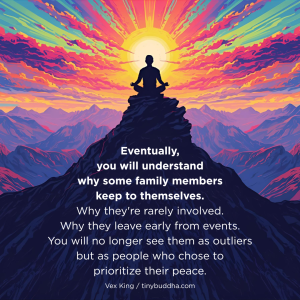
“Genuine forgiveness does not deny anger but faces it head-on.” ~Alice Duer Miller
As an adult survivor of childhood sexual abuse at the hands of a relative, I had become accustomed to keeping secrets. Silence, I was taught, was a good thing. It protected people that I loved.
So for over a decade, I carried the dark and overbearing weight of my past in secrecy and in silence, believing I was the only one in the world who’d ever experienced such abuse—until I learned from a college workshop that one in four women and one in five men fall victim to sexual abuse by the time they are eighteen.
Shocked and convicted, a surge of emotions overwhelmed me.
Later, for the first time, I was able to share my secret with my mother. She was devastated and we cried, but the conversation ended on a peculiar note: “You can’t ever tell your dad,” she said, “because it will destroy him.”
It felt as if I’d finally surfaced for air after drowning my entire life, and now I was being pushed back underwater, but sadly I accepted it. As aforementioned, silence was a good thing, wasn’t it? It protected people that I loved.
The seven years that followed proved to be the most tumultuous of my life. I battled suicidal ideation, clinical depression, anxiety, panic attacks, plummeting self-esteem, immeasurable anger and resentment, and the take-home prize of the millennia: unforgiveness.
I was a highly-trained victim at this point, putting on an Oscar-worthy performance.
And then one day, I’d had enough. I did what I’d always wanted to do: I got angry!
Now before you take a baseball bat to your ex’s four-by-four, I’m not talking about the type of anger that features fist fights and flying chairs on daytime talk shows. This type of anger is a process through which you can access the power and peace that can only come from forgiveness.
There are four steps I have experienced in this process:
1. Give yourself permission to get angry.
I was accustomed, as I’ve emphasized, to the golden rule of “silence.” Skeletons were better left in the closet, I thought. Unfortunately, mixed with my already existent people-pleasing ways, this was a recipe for disaster.
In my journey toward esteeming others above myself, as many of the world’s wisest sages have taught, I inadvertently evolved into a doormat. Talk about regressive Darwinism!
I wanted to be a good person, and so when I felt anger, resentment, and unforgiveness, I beat myself up over it. I truly believed that I was a horrible person for being angry over what had happened to me. Further, I didn’t want to be the “villain” in others’ eyes or the black sheep in the family who just couldn’t let go of the past.
But at long last, I finally gave myself permission to feel that anger to the fullest. I gave myself permission to own my anger, and in doing so, I validated myself. I acknowledged that I wasn’t an unfeeling robot or a mindless drone—I was a flesh-and-blood human being with a deep spiritual wound that deserved proper treatment.
I allowed myself to acknowledge that I was in pain, that it didn’t feel good, and that I was angry about it. As such, a process could then—and only then—begin. I could now travel into the deepest and darkest parts of my soul and bring light to those forgotten caverns.
2. Share your story.
There was a time when I believed I would never share my story with a single soul. I could’ve never imagined those long years ago how untrue that would become.
Every time I share my story, I feel more and more powerful. I’m no longer a victim—I’m a survivor! Sharing your story is not about incriminating the wrongdoer. It’s about validating yourself, owning your experience, and committing to living your best life.
There may be someone reading this right now who has never shared the life story that’s so burning inside their heart. Whether it’s writing down the story in your personal journal or finally telling a trusted, long-time friend, take this bold step forward. You will feel freedom like never before.
Your story is nothing to be ashamed about. Come forth from that dark corner into the light. The weight feels lighter with every word you speak, and the story will become easier to share with each telling.
I believe that if more people realized how liberating it feels to finally share their story, more people would in turn experience the love, freedom, and peace that they so desire and so deserve.
3. Seek support and wisdom.
Dealing with anger while bearing the goal of forgiveness in mind requires a life support team. You need to surround yourself with loving people who care about your personal growth and want the best for you.
And while these people will support your need to validate yourself and feel angry, they mustn’t be people who will talk you out of forgiveness. Instead, ensure that your life support team is stocked with people who understand the power and love that comes from forgiveness and why it’s vital to your permanent joy.
These people should also be able to ensure that you don’t act out on your anger. Getting angry doesn’t mean treating people unkindly and it’s not a “Get Out of Jail Free” card for nasty behavior and cruel words.
You’re not excused from characterizing love just because you’re wounded. Trust me: you don’t want to live like that anyway. I can personally attest that it will only leave you feeling more deflated and defeated.
Whether it’s friends or professional help, your support will be a safe space where you can share your struggles, open yourself up to the insight and guidance of others, and apply their suggestions to your life toward more positive and empowered living.
4. Have the conversation.
Once you have progressed through the above steps, there will come a time when you will want to have “the conversation” with the person who has hurt you. If you’re like me, you might be shaking your head, declaring that it won’t happen. I thought the same—until it did.
And when it did, fists didn’t fly. Neither did chairs.
Because I’d journeyed through the previous steps, I was able to come from a place of perfect peace. I was in control of my emotions. And I was able to lovingly explain to this individual how they had hurt me, how it had made me feel, and why I therefore struggled with extending forgiveness.
Six months later, the process came around full circle and I was finally—finally—able to let go of the past and forgive. This didn’t mean forgetting about what happened. It meant reclaiming my life and deciding that the past wasn’t going to have any control of my happiness or my future.
All because I’d made the choice to stop denying my anger and instead face it head on.
What about you? Has denying anger kept you from moving toward forgiveness and peace? Try the four steps above. Go ahead, get angry (constructively)! Freedom’s waiting on the other side.
About Meredith
Meredith is a writer who loves to explore topics such as mindfulness, peace, and happiness. In her free time, she enjoys practicing yoga, spending time in nature, and volunteering with animals.













 Though I run this site, it is not mine. It's ours. It's not about me. It's about us. Your stories and your wisdom are just as meaningful as mine.
Though I run this site, it is not mine. It's ours. It's not about me. It's about us. Your stories and your wisdom are just as meaningful as mine.
This is a great post. It’s been years since I’ve let myself feel anger; I’m not sure I know how anymore, but I’ll definitely give it some thought.
I do not think that giving ourselves permission to get angry is a good idea. The reason being that when we are angry we would do actions that we may regret later in life. And since it is a choice to be angry or not, why choose to make ourselves upset, instead of choosing something that we can let ourselves enjoy?
This is a great article showing how we can choose our emotions to be and how can we control them.
http://blog.tsemtulku.com/tsem-tulku-rinpoche/inspiration-worthy-words/anger.html
Wonderful post, thank you for sharing and being vulnerable! It was wonderful to see the amazing progression in your situation. Wonderful steps you took, and advice to share that will be a value to SO many!! I am definitely an advocate of talking and releasing those experiences to receive support and validation. It is amazing how our mind sabotages us into thinking that we will be judged, dismissed, looked down upon, treated differently etc, when that is the opposite of what actually happens when the truth gets spoken. (the majority of the time) Our ego protects us from that small possibility of the negative instead of encouraging us in a healthy way “just in case”….and so much suffering comes to us in following that path. It is really unfortunate! 🙁 I am so glad you found your way!!!!!!!!! HUGS to you! 🙂
Anger does not go hand in hand with physical outbursts. most people think anger means doing or saying things that we will regret but that is negativity not anger.
I willingly shared my story of sexual abuse but have just realised from reading your article that what I was never willing to share was my own destructive behaviour as a result of the abuse.Shame and guilt from my own behaviour(triggered by the after affects of abuse) has been my secret.What the abuser did is not my secret because that was his behaviour, but what I have done in anger and self destruction since I have found much harder to own up to because thats what I did……………its been a tough journey home….thanks for your article it was thought provoking and sensitively written, all the best x
Thanks so much, my friend. Yes, it’s astounding the impact sexual abuse can have on the individual. Some of the impact doesn’t even manifest itself until decades later in some cases. Like you, I also engaged in self-destructive behavior. Being willing to see that has helped in the healing process immensely!
Thanks, friend! :0) For years, I swore I would never share my story! All I ever felt was shame and embarrassment that such a thing could happen to me. I was allowing myself to be victimized, if you will. I also was worried what others would think or say. However, I found such liberation and empowerment in sharing my story and it was astounding how those I first told responded with love, openness, and even in some cases: understanding from personal experience. Vulnerability is hard but when you push through to the other side, you can feel so much freedom!
Hi Vinnie, I appreciate your standpoint and I can definitely see your perspective. I believe that it’s possible to manage our anger however so that it doesn’t result in the regrettable actions of which you speak. We aren’t without feelings, after all. As part of this world, it’s only naturals that feelings will come to us at times. What we choose to do with those feelings will determine in what ways we grow. Acknowledging anger, embracing it, feeling it, and then learning to push through it until there is only love left is what I’ve found to assist me in my journey to forgiveness. Of course, everyone’s journey is different. :0)
Well said, my friend. Yes, there is a difference between feeling anger and exuding negativity.
Best of luck to you, Andrea. Some soul searching and meditation might assist you in getting in touch with those feelings that have been suppressed for some time. It’s liberating and I wish you the best in the process.
Amen to that…so true! I am so glad you did, and it is easy to fall back into “hiding”, I wish you continuous courage and strength!!! 🙂 A wonderful book, if you haven’t read it yet, is Daring Greatly by Brene Brown about vulnerability! HUGS to you my Tiny Buddha friend!!! 🙂
Hugs back! I will definitely add that title to my ever growing Books to Read list! Thanks! :0)
Childhood is the most impressionable period
of life. Any trauma suffered in those formative years can scar a
child’s future. Child sexual abuse is one of them.I recently watched a documentary and want to share it with the world.watch “Speak Up! It’s Not Your Fault!” on link below
http://www.cultureunplugged.com/documentary/watch-online/play/4694
There are definitely scars that can carry over into adulthood. I remember when those scars started to surface in my twenties, seemingly out of nowhere. I realized through therapy where they were coming from, however. Thanks for sharing this documentary! ~Lily
I know your story quite well, Lily. I’ve lived it. But, in my case, I had two parents who protected the abuser and continue to guard this secret for him. Unfortunately, because of the choices they’ve made, our relationship will remain fractured. All three are forgiven in my eyes, but it doesn’t mean their toxic behavior will be tolerated. I was smart enough to join a women’s sexual abuse survivor’s group at 19, the youngest in the group. There, I learned about just allowing myself to feel for once–anger, shame, guilt, forgiveness, and even happiness! I thrived in the group, those brave women fostered my survival. That’s why it’s so encouraging to see young people who’ve survived sexual abuse take control of their lives! My heart goes out to you and everything you’ve endured. But, you’ve made something of your pain and reclaimed your true self. That’s true courage!
Thank you, Sharon! I’m glad that you had the courage to join that support group. What a blessing.
I am dealing with the anger as we speak and it’s extremely hard. I have been a people pleaser my whole life, Not rocking the boat, hiding my feelings, running away from situations. My behaviour in certain situations has been quite questionable as I mimicked behaviour I had seen my whole life from my parents. In turn I caused frustration with others and ended up beating myself up again and again about how I had behaved. I have finally recognised that I have to change myself in order to forgive as well. Thank you for your story. It’s motivating me to face the truth and face my anger even if I’d rather run and hide and pretend that everything’s fine.
Thank you for a great article. Embracing my anger has always been such a challenging task for me. I dread having conversations with the person who made me angry. Before I know it, anger becomes hatred. I generally suppress my anger and forget about it. My anger hides out until I explode. I’m learning to release my anger as quickly as possible although it’s a work in progress. Your article hit home about sharing story and seeking support from the right people. I sought support from the wrong people at times and they made the situation feel worse than it really was. I’m learning to seek support from family and friends who genuinely care about me. It feels really good to know that no matter what happens, I always have the choice to forgive and let go.
We have been through similar discoveries. I’d suggest that, maybe, one majorly freeing aspect of owning your anger is that you are giving yourself permission to be on your own side. Hiding or trying to control away the anger is an act of shame, when we think that we don’t have the right to feel anger or that we’re bad people if we’re mad. The focus is on controlling your “bad” side. But when you address, accept, and even celebrate your right to be angry, you show love to yourself by letting yourself feel the same way you would if those things had happened to someone else you love. You take your own side, which by nature says that YOU are just fine- what happened is not fine.
I’m currently in the process of finding and destroying the lives of my former tormentors. Social media has made that possible, now, I know what you are thinking but my life is worthless because of them, they destroyed me from the inside out, I was never able to get anywhere in life because of my crippling anxiety and overwhelming depression. I cannot forgive, it’s simply impossible. Don’t get me wrong, I admire you, I really do. But as soon as I even entertain the notion of forgiveness, I honestly feel sick to my stomach. I need to destroy them, and then I can finally destroy myself and get some peace.
What about the perpetrator owning your anger. Why do you think they should not be incriminated? Maybe they aren’t evil? Really?
I have been in a similar situation. In my case, the abuser was my stepfather. I told my mother while they were separated because I was too afraid to tell her while they were together. I want to be clear, I was not raped. Just pressured to have a relationship that would turn sexual when I turned 16. I was 14 at the time. However, my mother took him back and because I told her what had happened, he set about making my life a living hell for years. My Mother did and said nothing. When I shared my story with a select few, and one I only told because I believed she was his next target, it backfired on me and I was told that if asked I would say I lied. He and my Mother confronted me together, and I complied. I am now 50 years old and I have pushed the anger down for a very long time, and continue to see them, paste a smile on my face at family functions and pretend that nothing happened. I had a conversation with my mother last year, and thought I had made some progress but then, about a month ago, he had an annual state award named after him, “The Unsung Hero Award.” I have been battling anger ever since I heard about this award. Today, I finally acknowledged how angry I am. He denies anything ever happened and when I have shared my story, tells people it is all in my head, I either made it up or lied. He tells them it is something I wanted to happen, and it didn’t, I imagined it did. So I sit here fuming, trying to see a way to forgive, yet finding no clear path to do so.